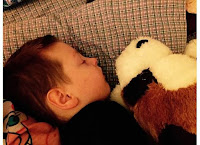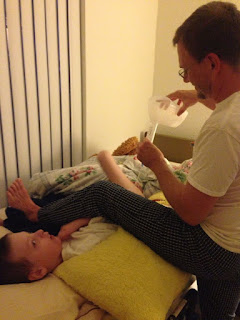When I first started blogging back in 2008 I was more
interested in politics and social
issues. Don’t misunderstand – I’m still interested, but I do not wish to stir up debate with a blog post that I have no
time or intention in participating in after the fact. Life took our
family on some interesting turns so my blog has morphed into more of something
that helps me document and work through these turns. These posts help me work
out the thoughts that are in my head.
That said, although the blog
lately has been about Willy and our journey with his transition, this post is
about Grant. He’s 14 and a freshman in high
school here in Ann Arbor. To say that he’s had an interesting life is an
understatement. When Willy had his first grand mal seizure on July 9,
2004, Todd was home alone with both boys. Grant was there, saw the whole
thing, had to ride along with Todd and Willy in the ambulance, and wait at the
hospital until we could find someone to come get him. He’s seen the good, the bad, the ugly. I can’t even begin to describe what he’s seen and internalized. He learned how
to get Willy off the bus, get him in and out of his wheelchair, feed him, give
him his medicines, play with him, change his diaper, and properly position him. Seizures didn’t scare him and he knew how to look out for them and what
to do.
The night Willy passed, Grant’s first words to me were
something to the effect of, “Mom, he’s okay now. He’s healthy now and his
body works.” The first few weeks after Willy died he was a huge source of
comfort, often just patting me on the back and asking me how I was doing.
He’s a 14-year old guy. He’s irritating sometimes and we don’t always speak the
same language. But man, I love that kid.
I called him a kid the other day and Ted said we should
probably be calling him a guy now. He’s not
a kid anymore. And he's turning into a really neat guy. We went out on a mother/son
outing last Friday night. We went
downtown Ann Arbor to a fancy dinner and then we perused a few shops. We went to my favorite store, Crazy Wisdom,
and he bought himself a neat set of Russian nesting dolls that he thought were
cool. In fact, when he realized that they stacked and that there were four
separate ones hidden inside, he literally squealed with delight and exclaimed, “What
kind of wizadry is this?” It was
hilarious. I hadn’t seen him that animated in forever.
 |
| Grant with his newly found Russian nesting dolls |
This past weekend, I made him answer these questions that
were going around facebook. Here are his
answers:
Without ANY prompting, ask your kids
these questions. Its a great way to see what they think. Copy and repost with
your child's name and age.
Grant, Age 14
1.
What is something I always say to you?
I love you.
2. What makes me happy?
When I get good grades.
3. What makes me sad?
When I don't get good grades. Which usually doesn't happen.
4. How do I make you laugh?
You don't. Just kidding. You're silly and lighthearted.
5. What was I like as a
child?
I don't know what you were like as a child. Annoying.
6. How old am I?
45. (At least he got that one right.)
7. How tall am I?
5'7". (He gave me an extra half inch!!)
8. What is my favorite
thing to do?
Clean the house.
(I gave him a look.)
Clean the bathroom?
9. What do I do when you're
not around?
I don't want to know.
10. What am I really good
at?
Cleaning. Numbers. Math.
11. What is something I'm
not good at?
Nothing. (With heavy sarcasm.)
12. What do I do for a job?
You buy things and pay for things at U of M.
13. What is my favorite
food?
Everything.
14. What do you enjoy doing
with me?
When we go out on the town together.
I had to crack up at some of these but the first and the
last warmed my heart. He hears it when I
tell him I love him and he enjoys going out on the town with me. That’s a parenting win, right?
Grant has his first set of final exams this week. He studied and filled out study guides. I helped him go over them and quizzed him. He seems ready but I
can tell he’s nervous. I feel like this
week is a right of passage in a way. His first set of cumulative exams in high
school!
Next thing you know, he'll be asking for the car keys...























